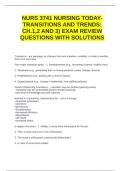NURS 3741 NURSING TODAY-
TRANSITIONS AND TRENDS:
CH.1,2 AND 3) EXAM REVIEW
QUESTIONS WITH SOLUTIONS
Transitions - are passages or changes from one situation, condition, or state to another
that occur over time.
Four major transition types: - 1. Developmental (e.g., becoming a parent, midlife crisis)
2. Situational (e.g., graduating from a nursing program, career change, divorce)
3. Health/illness (e.g., dealing with a chronic illness)
4. Organizational (e.g., change in leadership, new staffing patterns)
Factors Influencing Transitions - - transition may be desired (passing exam)
- transition may be undesirable (family member passing)
-new level of knowledge and skill required
Burnout is a syndrome characterized by: - -loss of energy
-emotional exhaustion
-weariness
-gloominess
-dissatisfaction
-decreased efficiency
-absenteeism
-self-doubt
-increased illness
5 stages of burnout - 1. Initially, a nurse feels enthusiasm for the job.
2. Then a nurse loses his or her enthusiasm.
3. The nurse's enthusiasm continuously deteriorates.
4. A crisis of some kind unfolds.
, 5. The nurse becomes devastated and unable to work effectively.
Early signs of burnout - -Irritability
-Weight changes
-Frequent headaches and gastrointestinal disturbances
-Chronic fatigue
-Insomnia
-Depression
-Feelings of helplessness
-Negativity
-Cynicism
-Angry outbursts
-Self-critical attitudes and remarks
Burnout can leave nurses vulnerable to: - -depression
-physical illness
-drug and alcohol abuse
Examples of self-care behaviors include: - -managing stress
-seeking information about how to maintain or improve one's health
-exercising
-getting more rest
-eating a balanced, healthy diet
-making specific lifestyle changes that promote meaning in one's life (e.g., daily prayer,
meditation, daydreaming, affirmations).
A mentor: - -can be a trusted advisor, friend, teacher, or another wise person who
guides you in your career.
-Mentors are chosen by the mentee — not assigned.
-They focus on fostering the mentee's individual growth and development during an
extended period of time; however, their mentor/mentee relationship is open-ended.
There is no fixed period.
-Mentoring involves developing a professionally based nurturing relationship that
generally occurs during personal time rather than as part of a work assignment.
Mentors offer their mentees: - -valuable career and job advice
-personal experience
-networking contacts
-knowledge
-personal development




